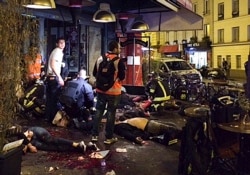The next nine months will determine the fate of 20 people on trial for the 2015 terror attacks in Paris. Of the ten-man team believed to have carried out the coordinated assault, just one is still alive. Salah Abdeslam was among the 14 suspects in court on Wednesday, the first day of the trial that could see him imprisoned for life. Six are still wanted.
There was tight security as the accused arrived at the Paris courthouse for the start of the nine-month trial.
Twenty people are charged in connection with the series of attacks on November 13th, 2015, that left 130 people dead and more than 350 injured.
Six are still on the run, or possibly dead, and will be tried in absentia.
Fourteen of them are in court – including the man believed to be the sole survivor of the 10-man cell that carried out the attacks.
Salah Abdeslam fled to Belgium, abandoning his suicide vest. He was finally arrested there four months later.
In court at the start of proceedings Wednesday, when asked to state his name, Abdeslam replied that there was only one god, Allah, and that he had forsaken all to become a fighter for the Islamic State group.
ISIS claimed responsibility for planning and carrying out the attacks on the Bataclan concert hall, the Stade de France football stadium, and several cafes and restaurants in eastern Paris.
Lawyer Victor Edou, representing eight survivors from the Bataclan, says it was very hard for his clients to hear Abdeslam’s words.
“It was very violent, very difficult for them to take,” he said, adding that they know the next nine months will not be easy.
But the survivors and families of the victims hope the lengthy proceedings will provide them with some answers.
It has taken six years for this case to come to trial.
In part because, as ISIS carried out more attacks – in Nice, Brussels, Barcelona and elsewhere – it became clear to investigators that there were links between the different cells. Several of those on trial in Paris also face trial in relation to the deadly bombings in Brussels in March 2016.
The sheer scale of this case also meant it took more time to prepare.
Some 18-hundred people are civil participants in the case – they include the survivors and families of the victims.
More than 330 lawyers are involved, and there 542 tomes of legal documents.
The high-security courtroom was specially constructed for this trial; and there are severe restrictions on who has access.
The proceedings are being filmed for posterity and are transmitted live to several rooms in the courthouse for the overflow of journalists and participants.
The accused face a range of charges including murder, attempted murder, providing guns and money, and terrorist conspiracy.
They face up to life in prison.





